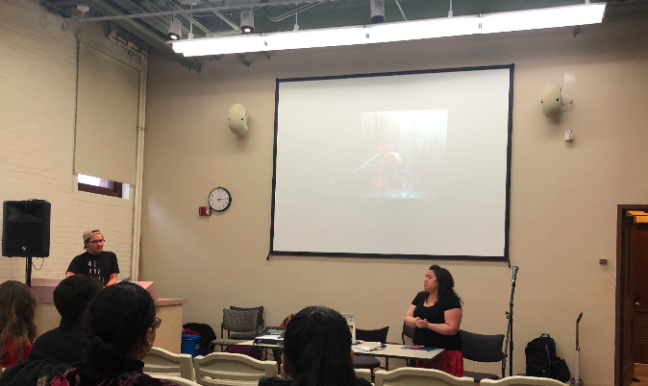Heather Brugel, a Native American historian, activist and member of the Oneida Nation, discussed the growing issue of missing and murdered indigenous women and girls throughout the U.S. and Canada Wednesday night.
Brugel said this event, hosted by Wunk Sheek, Movimiento Estudiantil Chicanx de Aztlán and PAVE, is especially important because Native women are often left out of the discussion about sexual assault.
Before beginning, Brugel said the talk would be “heavy” and may be emotional.
“I might get emotional. I know it’s not professional of me, but I’m human,” Brugel said. “These are my sisters, my grandmothers, my mothers and my aunts, and these are real women, real people.”
New Elders-in-Residence Program aims to improve experience of UW Native American students
Focusing on assaults against indigenous women is important because of the disproportionate violence they face, Burgel said. On reservations, women are murdered at a rate 10 times higher than the national average, and over four out of five Native women have experienced violence.
This high level of violence is largely overlooked, Brugel said, and there is a lack of both information on violence against Native women and investigation into crimes against Native women.
Brugel said these crimes are often perpetrated by non-Native people, and this violence is higher in urban areas like Madison.
Native American students experience difficulty transitioning to campus, lack UW support
The lack of laws that address it are part of the reason violence against indigenous women is so high, Brugel said.
“We have legislation that helps with the epidemic of missing and murdered indigenous women, or that … is supposed to help, but we also have issues within that legislation that doesn’t help at all,” Brugel said.
Brugel said there is a lack of legislation that addresses sexual assault of women of color and Native women specifically. Assaults on reservations are handled by the federal government in all but six states — California, Nebraska, Oregon, Wisconsin, Alaska and Minnesota. When states have no jurisdiction over reservations, crimes cannot be addressed as quickly, Brugel said.
Brugel said she believes such high numbers of assaults are linked to colonization and racism.
“Sexual violence can actually be seen as part of the logic for genocide. Racism can be seen as a process that will ultimately deem one group of people as dirty or unclean or inferior,” Brugel said. “From colonization, Native bodies have been seen as unclean … when you are seen that way, it makes it easier for someone to violate you.”
The hypersexualization of Native women and women of color also contributes to this sexual violence. Brugel said beer advertisements depicting sexualized Native women, and even the way Pocahontas was portrayed by Disney, puts Native women at risk.
Going forward, Brugel said policy decisions need to include Native women, because the ones that do not often prioritize white women. This lack of representation can be damaging to Native women.
“Often times policy is created without women of color in mind. They are left out of the discussion, even though they suffer these higher rates of violence. If policy can be created with women of color at the center of it, we might actually make some headway,” Brugel said. “Native women not only deal with physical violence but they also deal with bureaucratic violence.”















